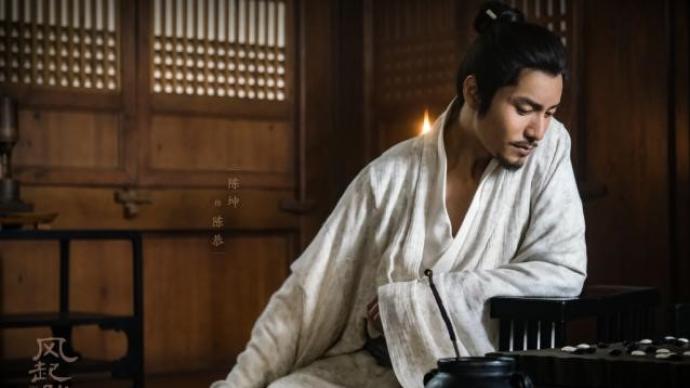
"The Wind Rises in Longxi", which has come to an end, has not staged a good show of the follow-up counterattack. When it was broadcast on CCTV8's prime night time, the real-time viewership rate of Kuyun hovered around 0.5%, and the audio-visual big data of the State Administration of Radio, Film and Television was only 0.755% in the first week, which broke through CCTV8's ratings base and was the golden night of CCTV8 in recent years. One of the worst TV shows ever. You know, CCTV8's prime TV dramas are more than 1% all year round, and there are not a few who break 2%. This made "Feng Qi Longxi" ridiculed by many audiences since its broadcast.
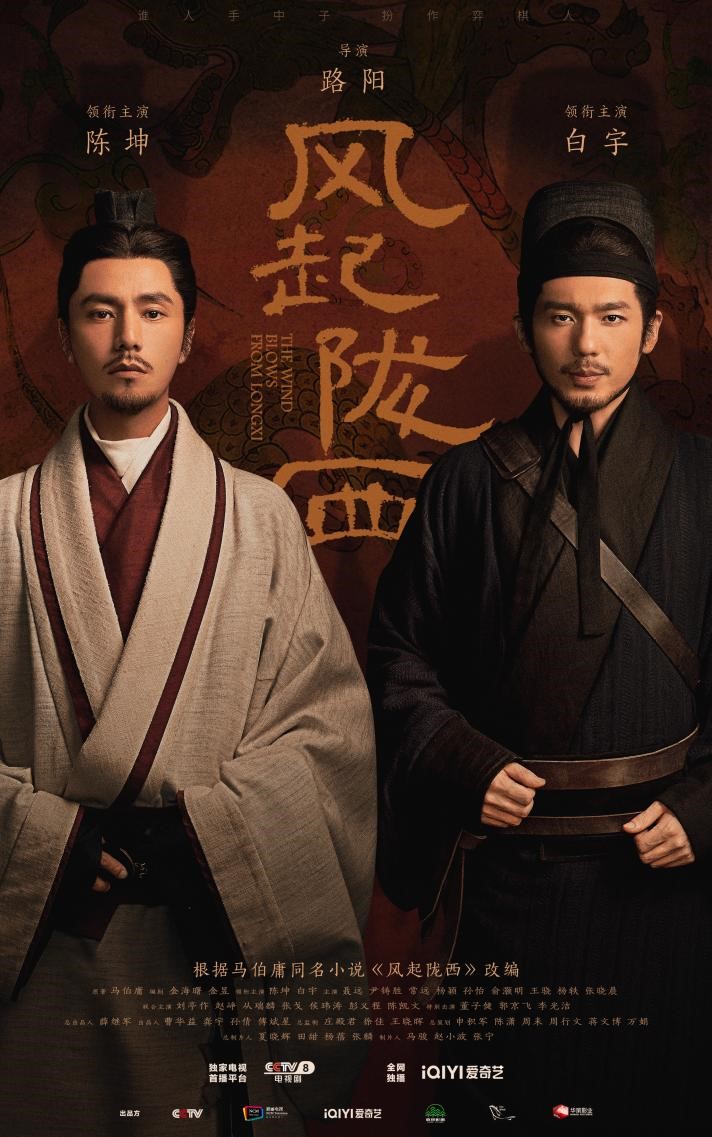
"The Wind Rises in Longxi" poster
If the audience of CCTV8 is mainly middle-aged and elderly audiences, they are not the target audience of "Feng Qi Longxi", but when "Feng Qi Longxi" was broadcast on iQIYI, the performance of the popularity value was not ideal, until the finale of members At 24 o'clock that day, the heat value has not yet exceeded 7300. For comparison, the popularity value exceeded 10,000 at the finale of "The World". Even before "The Wind in Longxi", iQIYI launched a vulgar ancient puppet drama "Best Wishes" (22 episodes), which was a big hit. The ending heat value also exceeded 8200.
The highest popularity on the night of the finale of "The Wind in Longxi" was 7281
Similarly, the effective playback list of Yunhe data also confirms this: "The Wind in Longxi" has a mediocre performance on video sites.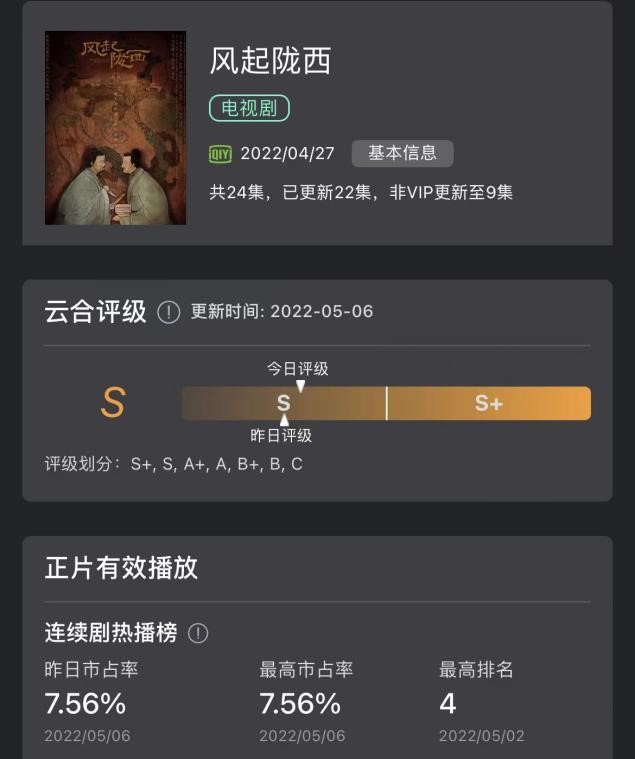
Yunhe data of "The Wind Rises in Longxi"
Even if the author personally likes "Feng Qi Longxi" (no interest related, purely personal preference), I have to face up to such a cruel fact: "Feng Qi Longxi" can't be said to be fluttering, but the response is definitely lower than the expectations before the broadcast , is an unpopular work.Why is this happening?
Obviously shot well
There is little objection that "The Wind in Longxi" is generally a well-received work. It is a rare ancient costume drama with high quality over the years. At the finale, Douban scored 7.8 points (it is expected to increase gradually).
What makes Lu Yang more prominent is his identity as a film director. "Embroidered Spring Knife", "Embroidered Spring Knife 2" and "Assassination of the Novelist" all received good reviews. In terms of aesthetics, "Feng Qi Longxi" has a good texture. 24 episodes are like watching 8 movies.
The drama is mainly shot in real scenes, paying attention to historical details, which can better restore the scenery and lifestyle of the Three Kingdoms era, and even distinguish the geographical space of Cao Wei and Shu Han; The most unleveled white light, but a lot of energy was used to restore the natural light during the day and the candlelight at night. The dark tones also set off a dignified and tense historical atmosphere; in the scheduling of shots, some shots with a strong sense of movement can reflect the director. The ingenuity of the film has a strong artistic sense of beauty; although there are not many fighting scenes, it is sharp, fast, and has a strong sense of rhythm.
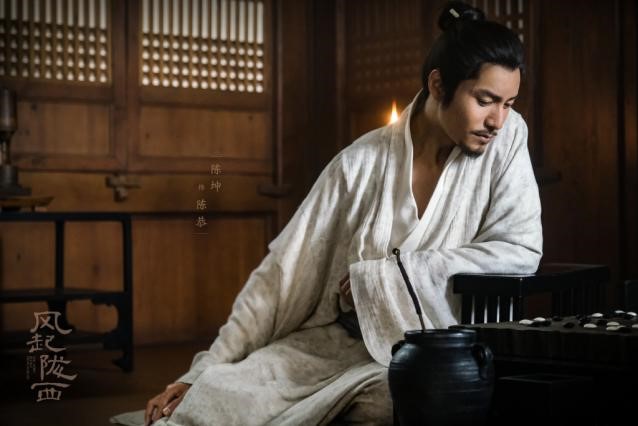
Chen Gong (played by Chen Kun)
As far as the story setting is concerned, "The Wind in Longxi" is also quite interesting. It is based on Ma Boyong's novel of the same name and is a "new edition" of the Three Kingdoms story, which creatively combines the Three Kingdoms and spy warfare.As soon as the drama version came up, Ma Su lost Jieting, which led to Zhuge Liang's failure in the first northern expedition. Zhuge Liang cut Ma Su with tears, and thus entered the main line of the plot: Zhuge Liang made a mistake in deploying because of the wrong information and lost Jieting.
It turned out that Shu Han had a spy lurking in Cao Wei, codenamed "Bai Di", and he was Chen Gong (Chen Kun). The information he passed on to Zhuge Liang (played by Li Guangjie) was correct. Unexpectedly, Cao Wei was also lurking a spy in Shuhan, codenamed "Candle Dragon". It was he who replaced the information of "Bai Di" and misled Zhuge Liang.
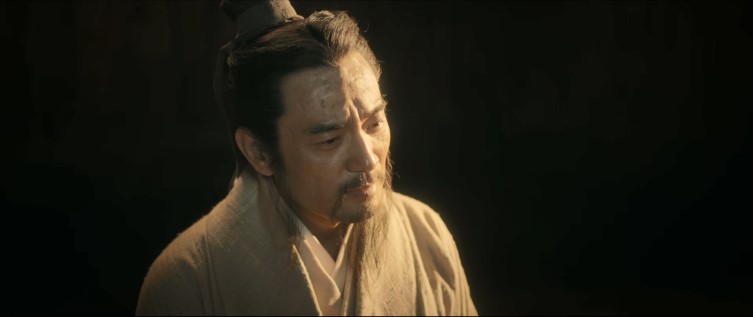
Zhuge Liang (played by Li Guangjie)
Shu Han thought that Chen Gong had betrayed, and Chen Gong, who was far away in Cao Wei, naturally had a mouth and couldn't tell. Feng Ying (played by Nie Yuan), the leader of the spy agency of Shu Han, sent Xun Xu (played by Bai Yu), who was in charge of counterintelligence in China, to go to Cao Wei to hoe. However, Chen Gong was Xun Xu's brother-in-law, and the two were close friends, so Xun Xu did not believe that Chen Gong had betrayed. So the two plan to work together to find out who the "Candle Dragon" is.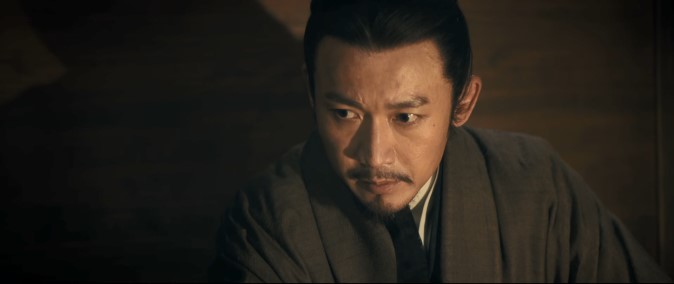
Feng Ying (played by Nie Yuan)
Afterwards, two flowers bloomed, one for each watch. After taking a pseudonym, Chen Gong continued to lurk in the Five Immortals, which was linked to Cao Wei, in order to find opportunities to find out the true body of "Candle Dragon"; on the other side, Xun Xu, who had returned to Shuhan, continued to track down Which high-level Shuhan might be the "Candle Dragon".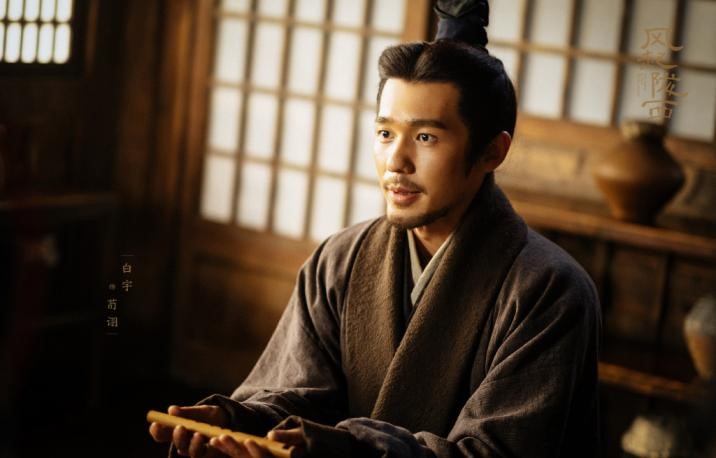
Xun Xu (Bai Yu)
Xun Xu didn't know if he didn't investigate, but the dark side behind the party struggle between the Shu and Han Dynasty was slowly revealed. Even the Chen Gong he trusted was not "pure", which also put Xun Xu in danger...In essence, "Feng Qi Longxi" is a spy war drama that revolves around "identity" from beginning to end. Like the male protagonist Chen Gong, he has different identities in Shu Han, Cao Wei and Wuxian Dao; when the audience thought he was just the "White Emperor", they later found out that he became the new "Candle Dragon" and became a double agent. .
It has information exchange, countermeasures, infiltration and infiltration, "torture to extract confessions", and loving couples who are also spies to torture and kill each other as "enemies".
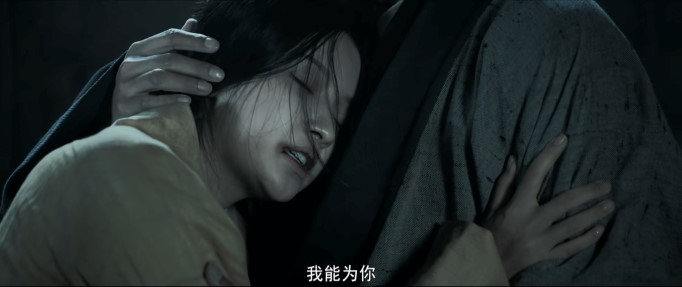
Zhai Yue (Sun Yi) died in Chen Gong's arms
The intelligence agency itself is also a power agency. It has its own factions, power struggles, betrayal and frame-up, and a lot of mutual restraint, strife and internal friction; intelligence agencies are generally involved in the struggle between high-level powers. Become a tool for eradicating dissidents and framing opponents...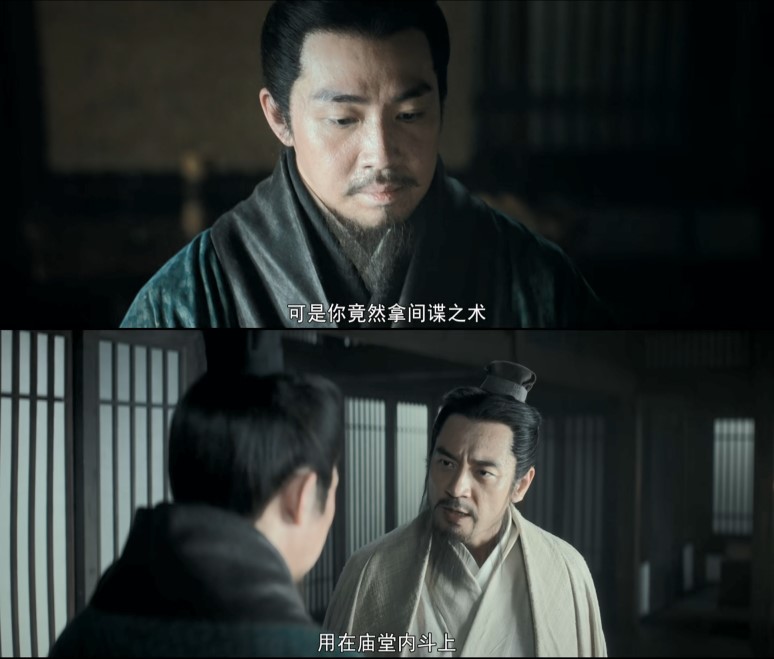
Zhuge Liang scolded Yang Yi (played by Yu Haoming) for eradicating dissidents with espionage
Therefore, in "Feng Qi Longxi", we can see the shadows of classic spy war dramas such as "Hidden", "Before Dawn", "Cliff" and "Kite". This also means that it has been quite successful in the construction of the plot logic and the shaping of the characters, at least allowing the audience who are following the drama to join the drama."Feng Qi Longxi" has a strong plot and strong conflict. The narrative rhythm is fast, and there are no sloppy bridges. The addition of female characters adds some emotional scenes, but if handled properly, the end of Zhai Yue (played by Sun Yi) is embarrassing; The suspense is advanced layer by layer, and the amount of information is dense, which makes the audience feel the thrill of customs clearance; the logic chain is not too tight, at least there are no dazzling bugs, and it can be justified.
The portrayal of the group portraits is excellent. Chen Gong is the best role Chen Kun has received in recent years, and it condenses a real sense of tragedy, which can remind people of Yu Zecheng, Zhou Yi (the drama version of "Cliff"), Zheng Yaoxian ("The Kite") and other roles; Jiang Yang in "The Silent Truth", Xun Xu is another representative role of Bai Yu. Even if the world is not benevolent, Xun Xu must adhere to the most basic moral conscience. Such a role seems easy to play, but in fact it is easy to play "false". ", Bai Yu's version of Xun Xu is convincing, his "axis" dilutes the preaching color, and the innocence he reveals when he relaxes fills the role.
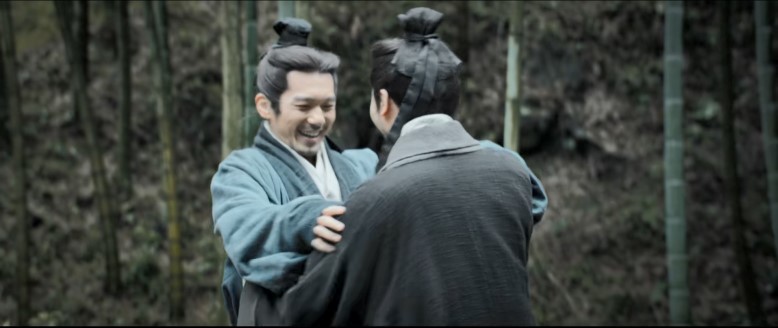
Xun Xu has a rare innocence
Feng Ying and Yang Yi (played by Yu Haoming) have similarities. They are loyal to an empty idea and regard other people's lives as waste, but Feng Ying is not afraid to sacrifice himself to be part of the plan. Yang Yi is purely selfish - this This kind of person is more terrifying; Chang Yuan plays Feng Ying's brother-in-law, who mainly assumes the role of comedy. He seems to be bluffing but is loyal to his brother-in-law. In this chaotic world, his sincerity is rare; Mi Chong (Wang Xiao) is reminiscent of "Hidden" In Li Ya, even in the "enemy" camp, the audience has no distaste for him at all; Guo Gang (played by Dong Zijian) is also very interesting and rambunctious, but his feelings for Chen Gong are a bit "silly and sweet"...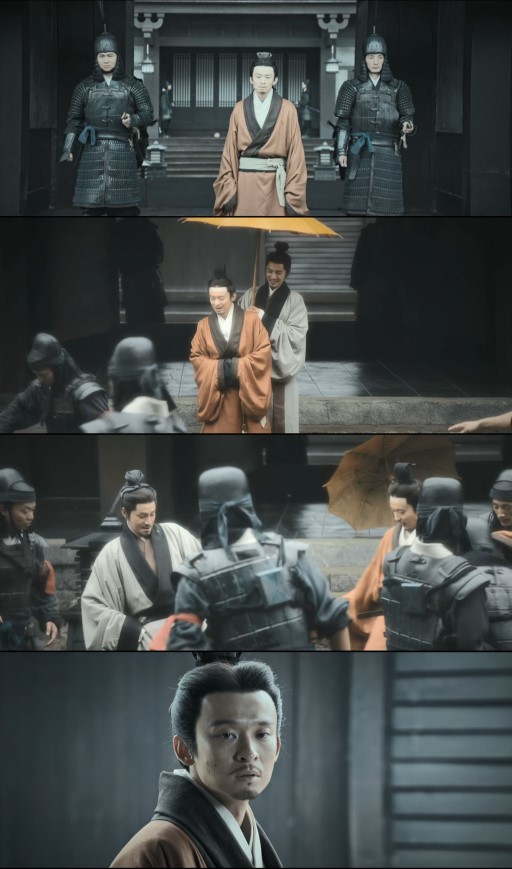
Guo Gang (played by Dong Zijian) thinks of his happy past with Chen Gong, and loses his soul
To sum up, there is no reason why "The Wind in Longxi" is an ugly drama with its aesthetics, logic, characters, and performance online.counterintelligence narrative
"The Wind in Longxi" is not a big hit. Some are caused by their own inadequacies, and some are not. Listen to it, let's take a peek too.
One, on the aesthetic level. For example, the use of natural light and candlelight has a very good effect on the big screen, but it may appear a little dim on the small screen, as if there was no sun during the Three Kingdoms period.
In terms of texture, the play is made like a real drama, with an antique flavor and some classical Chinese characters are also used. But the characters' dialogues are sometimes quite modern, such as "I have never been out of the field", "Don't pull the hills, make small circles", "I developed the field to go offline", etc., very similar to those in modern spy war dramas. lines. It is understandable that the creator wants the audience to better immerse themselves in the context of the times and empathize with the characters' plight, but all of this does not need to be reflected in the colloquial language. Now it is neither the past nor the present, but the two sides are not flattering.
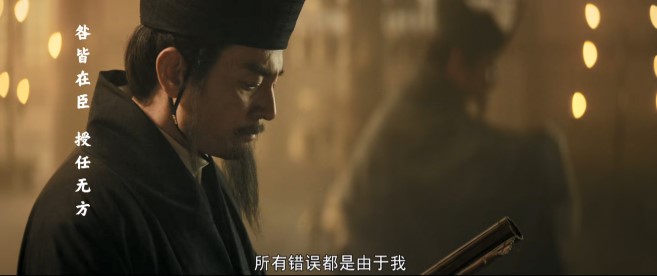
Classical Chinese lines have to be subtitled in vernacular
Second, the level of popularity. Although "Feng Qi Longxi" is a story of the Three Kingdoms, the protagonists in it are all fabricated, and there are many characters. It is not easy for the audience to figure out who they are in a while. Although its core is a spy war drama, it is not like the spy war drama of the Republic of China has formed a fixed pros and cons - everyone is no stranger to the Japanese invaders, the military and the Chinese, but "The Wind in Longxi" Si Wencao Concepts such as , inter-military division, and various official positions will still confuse people. It is generally unfriendly to the auntie audience. The author's mother is a loyal CCTV8 audience, but she did not stick to the first few episodes of this show.Third, and at the deepest level, there are two deviations in the thematic expression of "Feng Qi Longxi": the deviation from the front and rear of the plot; and the deviation from the audience's aesthetic expectations for the spy narrative.
Revolutionary era spy war dramas such as "Latent" have formed a stable narrative paradigm, and "faith" is their common theme, which highlights the great spirit of our party's soldiers who are brave and fearless and sacrifice their lives for justice. The protagonists are on the right side of history, and they are the ones who carry the dark floodgates for us. Therefore, the difficulties and obstacles they encountered in the play and the various sacrifices they made for the revolutionary cause can arouse the emotions of the audience and can also be transformed into aesthetics. The sublime feeling on the top moves us.
"Feng Qi Longxi" also has the expression of "belief", which is reflected in the front and middle of the plot. It did not break away from the value position of "praising Shu and denouncing Wei", "recovering the Han Dynasty" was to save the common people from war and live a good life. For example, shortly after the opening, a dialogue between Chen Gong, Xun Xu and Zhai Yue is passed. Chen Gong raised his glass and said, "To restore the Han Dynasty." Zhai Yue asked, "What is the restoration of the Han Dynasty?" Chen Gong replied, "For no more wars." Xun Xu also said, "For people like you and me, I can do it all. Have a good time."
For this righteousness, many little people sacrificed their family, love, friendship, including their own lives. Chen Gong and Zhai Yue died, Xun Xu was alive but lost everything he loved.
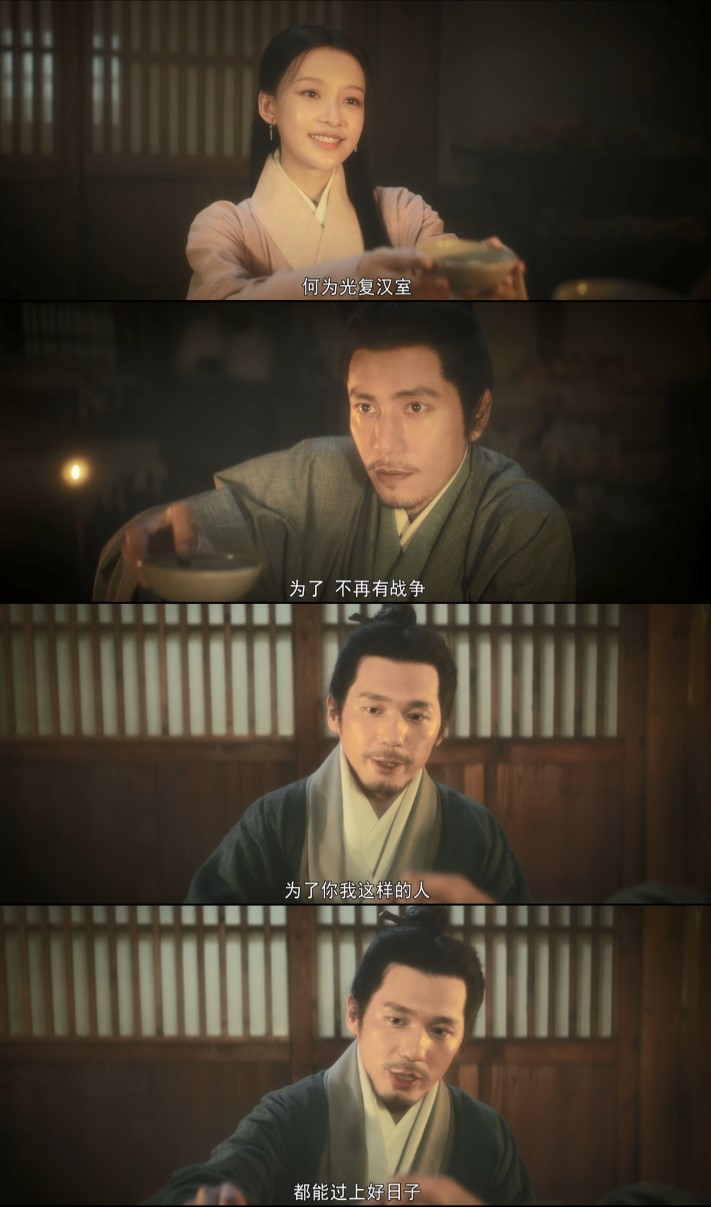
The belief in "recovering the Han Dynasty" is somewhat empty
The problem is, this "faith" narrative is hard to impress the audience. "Recovering the Han Dynasty" is too far away from us now, and the audience can't clearly see the "advanced" point of Shu Han compared to Cao Wei from the play. On the contrary, there are more filthy intrigues within the power structure of Shu Han (at least in the play This is the case), why did such a Han room recover? What's more, the real history has also proved that Shu Han's "ambition" has finally failed.As a result, the appeal of Shu spies' "belief" was greatly reduced. It can't arouse the widest emotional resonance of audiences like spy war dramas such as "Insidious". This is the first deviation of "Feng Qi Longxi": it is obviously a "spy war drama", but its belief expresses that the audience has no sense at all.
Of course, Lu Yang will never be so "vulgar", and these "family and country narratives" at the beginning are more like the need for trial, to publicize positive energy. After the second half of the plot, especially after the 20 episodes, everything is seen, and this "belief" narrative leaks everywhere, and its cruelty and inhumanity are fully exposed.
The most typical ones are Feng Ying and Yang Yi, who believe in the concept that everything can be used and sacrificed for the sake of righteousness. At the beginning, Feng Ying sacrificed Chen Gong's father for the so-called "righteousness"; now he and Yang Yi want to ask Chen Gong to kill Xun Xu in the name of righteousness. Feng Ying and Yang Yi spoke lightly and decisively. Do they care about human life? Don't care, all they care about is the concept of emptiness. This is the cruelty of big men and the coldness of history.
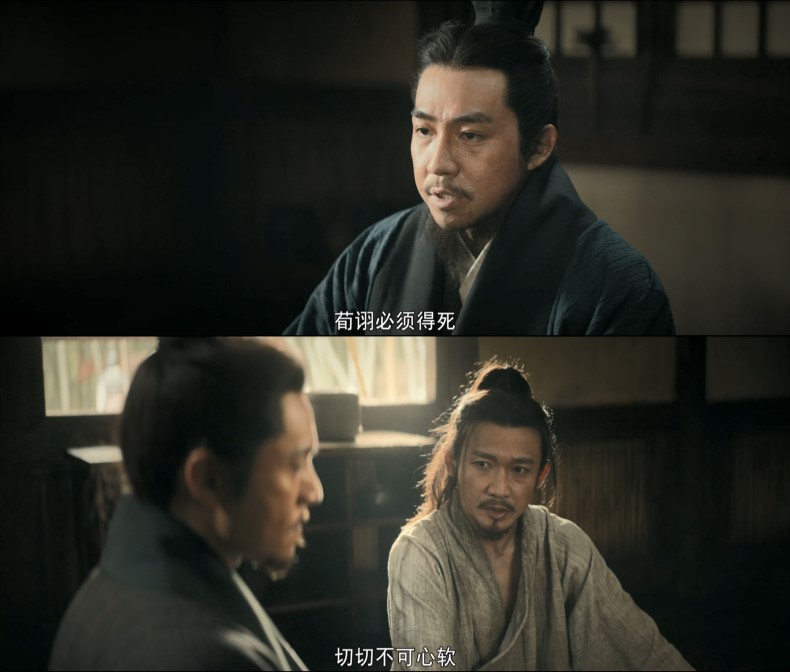
Feng Ying and Yang Yi can sacrifice anything for the sake of "righteousness"
Who represents the show's true stand? Xun Xu. Xun Xu is the director's voice. Xun Xu firmly believes and adheres to the most traditional positive values: fairness, justice, and rights. Small people can sacrifice for the sake of righteousness, but they must know in advance and willingly, instead of being confused as pawns, not being used after knowing it, and "righteousness" cannot be used as a pretext for "injustice".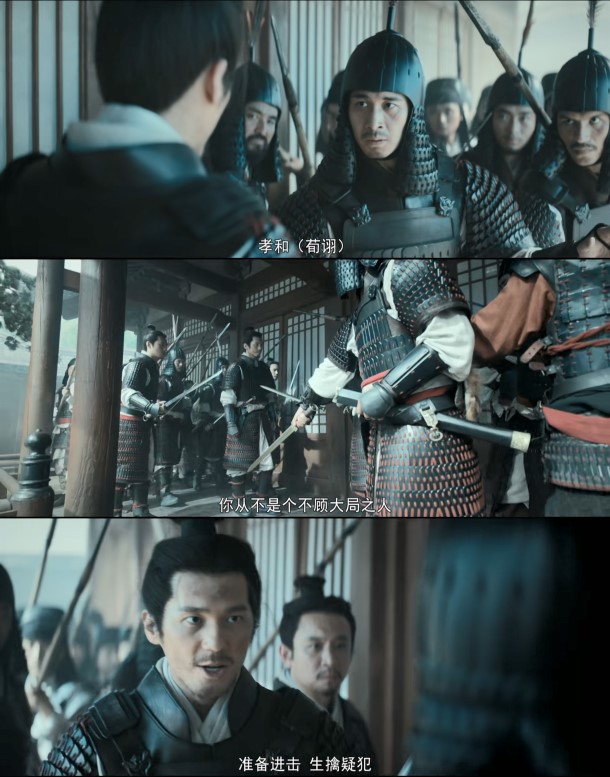
Xun Xu only asks the truth
But many viewers were misled by the previous plot and the announcement, and they didn't see the real intention of Xun Xu's character (not to blame the audience). So they were very puzzled: why did Xun Xu keep "adding chaos"? But Xun Xu must "add chaos". He believes in values that are different from those of Feng Ying and others. Naturally, he will not follow the path of Feng Ying and others. He must ask and understand everything. When the audience acquiesced that the "price" of a small person becoming a righteous person was nothing, Xun Xu wanted to pursue a truth for the "price".This is the second departure from the thematic expression of "Feng Qi Longxi". In its plot itself, there are two concepts that are debating, tearing and dismantling each other. Xun Xu's "adding chaos" is actually deconstructing the "belief" narrative of the entire play.
But it "covered up" too well, or what it really wanted to express was given too late, but instead made the audience disagree, misunderstood it, and even abandoned the show early.
If the audience persists to the end, they may hit the knot for Lu Yang's expression. The beauty of "The Wind in Longxi" lies in its "deviation": it deviates from the belief narrative of traditional spy war film and television dramas. On the contrary, it gives us a glimpse of the ruthlessness and shamelessness behind some righteousness. Of course, this does not mean that it has no faith. In the end of the series, Xun Xu embarked on a new journey - still for the big man. However, in any righteousness, there must be humanism. In this way, Chen Gong's voluntary sacrifice is tragic, and Xun Xu's despair is moving forward.
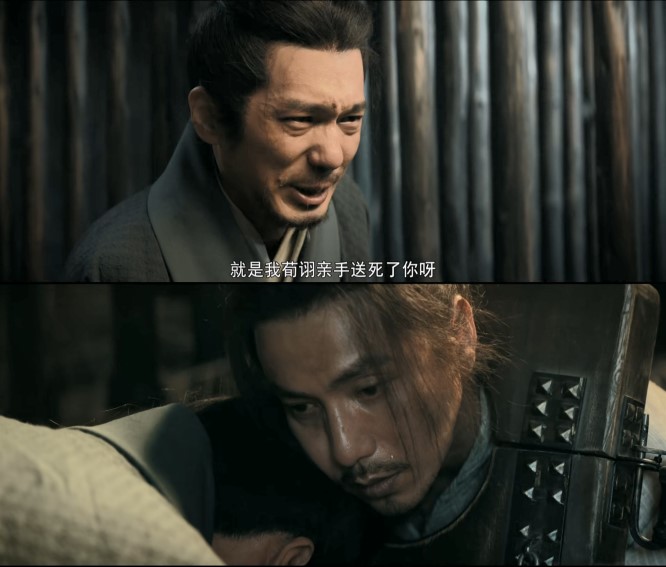
Chen Gong chooses to sacrifice
As a mass product, the thematic expression of the counterintelligence narrative is risky. "Feng Qi Longxi" has paid a temporary market price for its "coldness", but its coldness and depth are undeniable. It's not a big deal to be "unpopular" for a while, and I personally like to believe that time will be on this show's side.